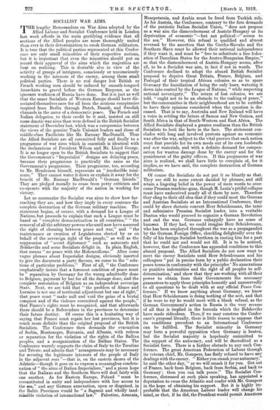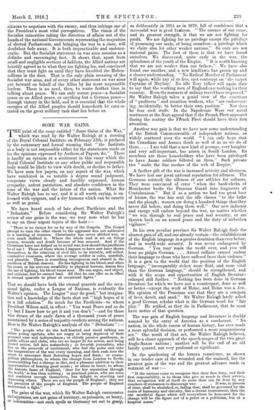SOCIALIST WAR AIMS.
THE lengthy Memorandum on War Aims adopted by the Allied Labour and Socialist Conference held in London last week affords in the main gratifying evidence that all sections of the Allied peoples are more thoroughly united than ever in their determination to crush German militarism. It is true that the political parties represented at this Confer- ence are only small minorities of their respective nations, but it is important that even the minorities should put on record their approval of the aims which the majorities are bent on realizing. This is desirable also in view of the activity of groups pf intriguers, consciously or unconsciously working in the interests of the enemy, among these small political parties. There is no real danger lest British or French working men should be induced by smooth-tongued Anarchists to grovel before the German Emperor, as the ignorant workmen of Russia have done. But it is just as well that the saner Socialists of Western Europe should have dis- sociated themselves once for all from the noxious conspiracies inspired from Berlin through Dutch, Danish, and Swedish channels in the name of a democratic peace. The French and Italian delegates, to their credit be it said, insisted on still more drastic war aims than were defined in the British Socialist statement of December last, which was a compromise between the views of the genuine Trade Unionist leaders and those of middle-class Pacificists like Mr. Ramsay MacDonald. Thus the Allied Socialists are all committed fully and finally to a programme of war aims which in essentials is identical with the declarations of President Wilson and Mr. Lloyd George. It is no longer open to the British Socialists to suggest that the Government's " Imperialist " designs are delaying peace, because their programme is practically the same as the Government's programme. Their programme, too, according to Mr. Henderson himself, represents an " irreducible Mini- mum." They cannot water it down or explain it away for the benefit of Mr. Ramsay MacDonald's German friends." They are pledged morally to cease from petty criticism and co-operate with the majority of the nation in working for victory.
Let us summarize the Socialist war aims to show how far- reaching they are, and how they imply in every sentence the complete destruction of the German military machine. The statement begins, of course, with a demand for a League of Nations, but proceeds to explain that such a League must be based on " complete democratization in all countries," " the removal of all the arbitrary powers who until now have assumed the right of choosing between peace and war," and " the maintenance or creation of Legislatures elected by or on behalf of the sovereign right of the people," as well as the suppression of "secret diplomacy " such as autocrats and Bolsheviks and some Socialists delight in. In plain English, that means " no peace with the Hohenzollern." After some vague phrases about Imperialist designs, obviously inserted to give the document a party flavour, we come to the " solu- tions of particular problems." First of all, " the Conference emphatically insists that a foremost condition of peace must be ' reparation by Germany for the wrong admittedly done to Belgium, payment by her for all the damage done, and the complete restoration of Belgium as an independent sovereign State. Next, we are told that " the problem of Alsace and Lorraine is not one of territorial adjustment but one of right," that peace must " make null and void the gains of a brutal conquest and of the violence committed against the people," that France's rights must be recognized, and that afterwards there should be a Referendum in the provinces to determine their future destiny. Of course this is a hesitating way of saying that France must regain her lost provinces, but it is much more definite than the original proposal of the British Socialists. The Conference then demands the evacuation of Serbia, Montenegro, Rumania, and Albania, with redress or reparation for the violation of the rights of the Balkan peoples, and a reorganization of the Balkan States. The Conference warmly supports the claim of Italy to the Trentino and Trieste, and admits that " arrangements may be necessary, for securing the legitimate interests of the people of Italy in the adjacent seas "—that is, on the eastern shores of the Adriatic—though it goes on to express a meaningless condem- nation of " the aims of Italian Imperialism," and a pious hope that the Italians and the Southern Slays will deal fairly with one another. As for Eastern Europe, Poland " must be reconstituted in unity and independence with free access to the sea," and any German annexation, open, or disguised, in the Baltic Provinces would be " a flagrant and wholly inad- roissible violation of international law." Palestine, Armenia, Mesopotamia, and Arabia must be freed from TurkiSh rule. As for Austria, the Conference, contrary -to the firm demands of the patriotic Italian Socialist Union, "does not propose as a war aim the dismemberment of Austria-Hungary or its deprivation of ecouomio "—but not political—" access to the sea." However, this refusal is qualified and almost reversed by the assertion that the Czetho-Slovaks and the Southern Slays must be allowed their national independence if they want it, and must be " free to substitute a free feder- ation of Danubian States for the Austro-Hungarian Empire," so that the dismemberment of Austria-Hungary seems, after all, to be a Socialist war aim, in fact if not in words. The Conference declined to adopt the absurd British- Socialist proposal to deprive Great Britain, France, Belgium, and Portugal of their tropical African colonies so as to spare Germany the humiliation of being the only loser, watering it down into control by the League of Nations, " while respecting national sovereignty." The return of lost colonies, we are told, " ought not to be an obstacle to the making of peace," but the communities in their neighbourhood are to be entitled to have their opinions considered when the question is dis- cussed. That is to say, Australia and New Zealand will have a voice in settling the future of Samoa and New Guinea, and South Africa in that of South-Western and East Africa. The Allied Socialists displayed a greater readiness than the British Socialists to look the facts in the face. The statement con- cludes with long and involved protests against an economic war after the war, subject to the vital proviso that each nation must first provide for its own needs out of its own foodstuffs and raw materials, and with a definite demand for compen- sation for wanton damage done by the enemy and for the punishment of the guilty officers. If this programme of war aims is realized, we shall have little to complain of, for it implies, as we have said, the complete destruction of German militarism.
Of course the Socialists do not put it so bluntly as that. They are still to some extent dazzled by phrases, and still retain a lingering belief in the power of mere words to over- come Prussian machine-guns, though M. Lenin's pitiful collapse must have undeceived nearly all of them by now. Therefore they cling to their old idea that if they could meet the German and Austrian Socialists at an International Conference, they could by sheer rhetoric convert Herr Scheidemann, the tame and submissive Prussian Socialist leader, into a veritable Denton who would proceed to organize a German Revolution and end the war. Germans unhappily have no sense of humour. If they had, we could imagine Herr Scheidemann, who has been employed throughout the war as a propagandist by the German Foreign Office; chuckling delightedly over the folly of his foreign Socialist brethren in casting him for a part _ that he could not and would not fill. It is to be noticed, however, that the Conference has appended conditions to this absurd proposal. The Allied Socialists do not now want to meet the enemy Socialists until Herr Scheidemann and his colleagues " put in precise form by a public declaration their peace terms in conformity with the principles ' No annexations or punitive indemnities and the right of all peoples to self- determination,' and show that they are working with all their power to obtain from their Governments the necessary guarantees to apply these principles honestly and unreservedly to all questions to be dealt with at any official Peace Con- ference." If we know anything about Germany, we know that Herr Scheidemann is doing nothing of the sort, and that if he were to try he would meet with a blank refusal, as the German Government's action in Russia is the very reverse of all that is implied in the formula which the Bolsheviks have made ridiculous. Thus, if we may construe the Confer- ence's proposal literally, there is little reason to suppose that its conditions precedent to an International Conference can be fulfilled. The Socialist minority in Germany may form a powerful opposition when Germany is beaten, but the Socialist majority is hopelessly committed to the support of the autocracy, and will be discredited as a Socialist force. There is a further obstacle to any such Con- ference. The great American Federation -of Labour through its veteran chief, Mr. Gompers, has flatly refused to have any dealings with the enemy. Either you smash your autocracy, he said the other day, or we will smash it for you. Get out of France, back from Belgium, back from Serbia; and back to Germany ; then you can talk peace." The Socialist Con- ference, distressed at such plain speaking, has appointed a deputation to cross the Atlantic and confer with Mr. Gompers in the hope of obtaining his support. But it is highly im- probable that the American Labour leader will change his mind, or that, if he did, the President would permit American citizens to negotiate with the enemy, and thus infringe one of the President's most vital prerogatives. The vision of the Socialist minorities taking the direction of affairs out of the hands of the national Governments representing the majorities of elected Parliaments, and bringing the war to a close, will doubtless fade away. It is both impracticable and undemo- cratic. But the Socialist statement on war aims remains as a definite and encouraging fact. It shows that, apart from small and negligible sections of faddists, the Allied nations are heartily agreed as to what they are fighting for, and convinced that they must fight on until they have humbled the Hohen- zollems in the dust. That is the only plain meaning of the Socialist war aims, and of every other statement on war aims put forward on behalf of the Allies by far more responsible leaders. There is no need, then, to waste further time in talking about peace. We can only secure peace—a Socialist peace or an Allied peace, or anything but a German peace— through victory in the field, and it is essential that the whole energies of the Allied peoples should henceforth be conc3n- trated on the great military task that lies before us.



























 Previous page
Previous page